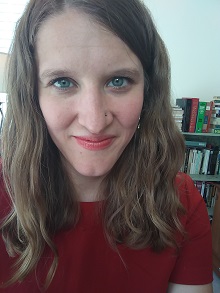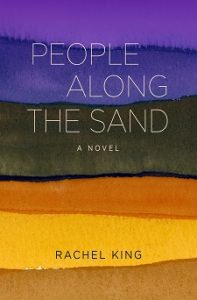A Job, Not a Career
Rachel King
 Half my lifetime ago, the summer after my freshman year at the University of Oregon, in the mornings I read books, then in the afternoons and evenings I worked as a line cook at Newport Bay, a floating restaurant on Portland’s waterfront.
Half my lifetime ago, the summer after my freshman year at the University of Oregon, in the mornings I read books, then in the afternoons and evenings I worked as a line cook at Newport Bay, a floating restaurant on Portland’s waterfront.
In high school, I’d liked Kate Chopin’s “The Story of Hour,” so I thought I’d like The Awakening—but I didn’t. I was impatient with Edna and her discontent. She seemed to have plenty of time for leisure or whatever else she wanted to do. Her suicide seemed self-indulgent and dramatic. I’d probably have more sympathy for her now.
Around that time, when I told my mom, a teacher, homemaker, and first-generation college grad, that I was reading The Feminine Mystique, she criticized Betty Friedan. Women only caring for a household had more time than the vast majority, who worked menial labor jobs as well as cared for households, she said.
If you’re a mother of several children doing repetitive and labor-intensive stocking or packing all day at a grocery store or factory, do you think you’d have time or energy to use your creative facilities later on? The “problem that has no name” was for the rich, she thought. A “career” was for the self-obsessed; most women had jobs in order to provide for themselves and their families.
These are the values I’ve inherited and questioned.
When my character Marilyn leaves her family in my novel People Along the Sand, it’s over money. Sure, she and her husband are having communication issues, but the crux of the matter is she is more frugal than he is, and doesn’t want to go into more debt to expand their motel. He unilaterally makes the decision to expand, so she leaves. From the beginning of this project, over a dozen years ago, I knew I didn’t want her leaving for vague reasons.
I also knew I wanted to retain the option of her coming back. I wasn’t sure she’d return, but I wanted to investigate what needed to happen for that to be a possibility. Her husband paying her for her bookkeeping? Her coming around to his point of view? Her loving the property and location and wanting to return for that? These are some of the options I wanted to explore through the narrative.
My novel is set in rural Oregon in 1967. When my mom first read it, she said the women were unusual. One of them, Leah, grew up in a logging camp, started a bakery at age eighteen, and never had children. But novels need unusual characters: as long as they are believable, I said. I had tried hard to make them a possibility, Leah, yes, but also Marilyn, her leaving in those circumstances and in that place and in that time period. My mom admitted that yes, it was a possibility there were women like that then.
Of my ten female cousins and siblings, all who live in the West and eight who live Oregon, half of us have college degrees. Two went to college in the Midwest, then came back: one became a nurse partly so she could work around her children’s schedules, the other worked in social services before she had kids.
I’m the only one who moved all the way to the East Coast. For over a decade, I had an unsteady “career” in publishing, until I could no longer handle being away from home and the low pay. Now I’m back in Portland, working a less prestigious, better-paying job to support myself and my books, my surrogate kids.
These women, who don’t have careers but jobs—like Marilyn and Leah, like my cousins and siblings, like my mom and myself—what do we want? Always close relationships, often to live in a place we love, sometimes financial independence. I reach across decades, I reach into fiction; we are as similar as we are different.
—
PEOPLE ALONG THE SAND
 “Profoundly attuned to the natural environment and its impact on all those who live there, Rachel King’s vivid People Along the Sand takes a lucid and discerning look at how people can belong to a place and whether or not a place can really belong to a person.”
“Profoundly attuned to the natural environment and its impact on all those who live there, Rachel King’s vivid People Along the Sand takes a lucid and discerning look at how people can belong to a place and whether or not a place can really belong to a person.”
-Kathleen Rooney, author of Cher Ami and Major Whittlesey
It’s 1967 in Kalapuya, a town on the Central Oregon Coast, and Jackson Ryder decides to build a second story onto his motel. His wife, Marilyn Ryder, doesn’t want to take on more debt for an expansion. Their ongoing dispute prompts Marilyn to leave Jackson and stay with her friend Leah Tolman, a bakery owner and advocate for the Beach Bill, the legislation that will make all Oregon beaches public land. While Marilyn becomes an activist, her adolescent son, Tim, befriends Elliot Yager, an elderly lighthouse keeper who wants the public to stay off his beach.
A novel about the pleasures and limits of solitude for five distinct and deeply human characters, centered around the passing of the Oregon Beach Bill and published in time for the fifty-fifth anniversary of the historic legislation.
BUY HERE
Category: Contemporary Women Writers, On Writing
























